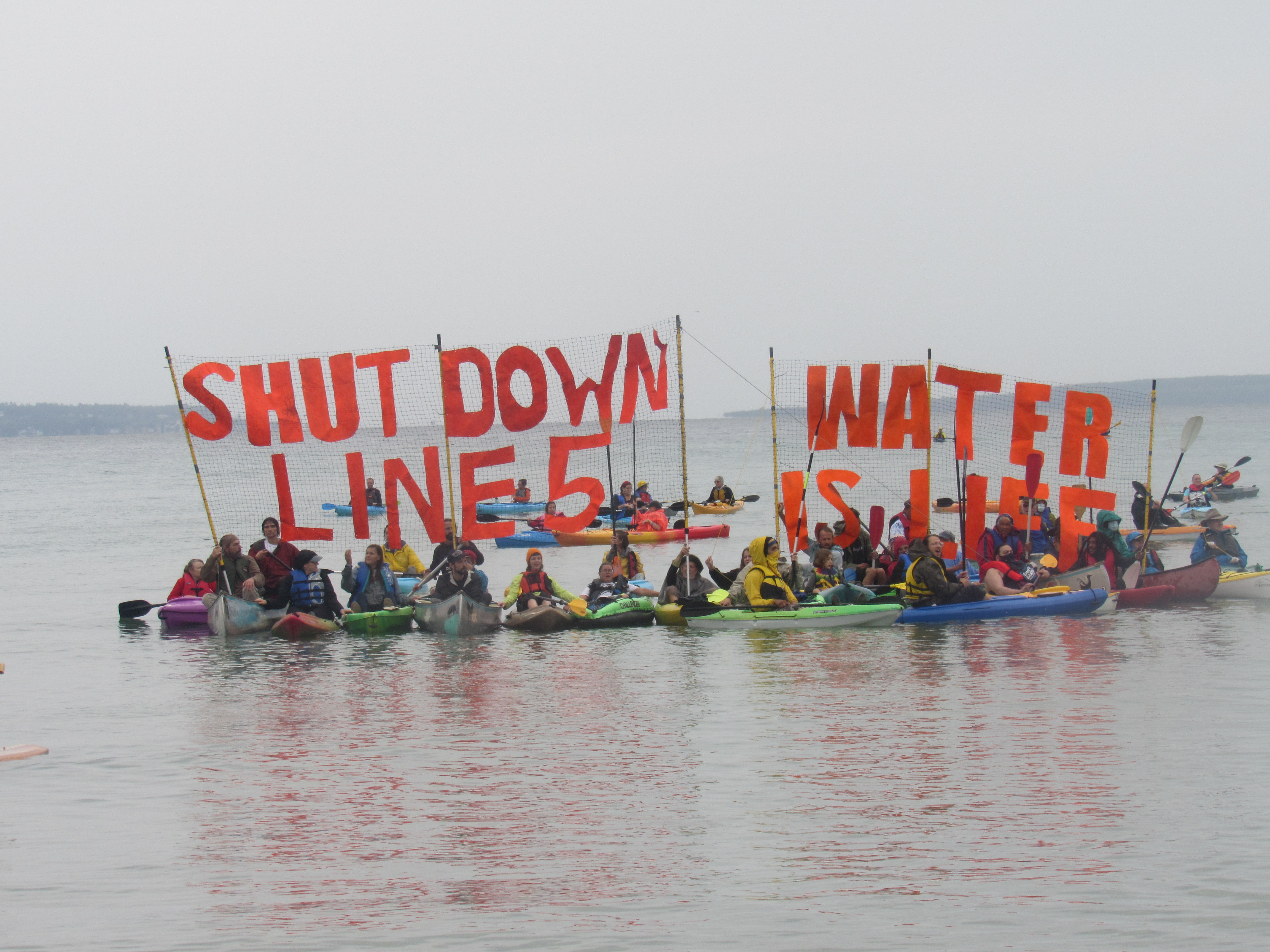
- Details
- By Native News Online Staff
Led by the Bay Mills Indian Community, more than 60 tribal nations from Indian Country have weighed in on Michigan Attorney General Dana Nessel’s lawsuit to move the Line 5 oil pipeline from the heart of the Great Lakes.
The Tribes submitted an amicus brief supporting Nessel’s claims and asking the U.S. Court of Appeals for the 6th Circuit to remand Nessel v. Enbridge to state court, a move opposed by the Canadian giant Enbridge, which owns Line 5.
Line 5 is a dangerous outdated oil-and-gas pipeline that poses unacceptable risks of an oil spill, especially as it travels along the lakebed through the Straits of Mackinac in a four-mile section known as the dual pipelines.
“Near and far, Anishinaabe people have united to protect the Great Lakes,” Bay Mills Indian Community President Whitney Gravelle said. “We stand behind Attorney General Nessel because we know that shutting down Line 5 is the only way to protect everyone who depends on the land, water, and natural resources within the Great Lakes, including Anishinaabe people exercising our treaty rights.”
Nessel sued Enbridge in Ingham County Circuit Court in June of 2019, alleging that Enbridge is violating the Michigan Environmental Protection Act (MEPA), state public nuisance laws, and the public trust doctrine by operating Line 5 in the Straits of Mackinac. Although the case has been ready for a decision by the state court for more than two years, Enbridge has prolonged it by removing the case to federal court, missing the deadline by over 850 days.
Bay Mills and other Great Lakes tribal nations have hunted, fished, and gathered medicines in the Straits for thousands of years – since time immemorial. In 1836, they ceded vast acres of land and water including the Straits to the U.S. government.
The Great Lakes provide fresh drinking water to more than 40 million people.
In the creation stories of the Anishinaabe, the Straits of Mackinac are where the Great Turtle emerged after a flood to create the North American continent, which the Anishinaabe refer to as “Turtle Island.”
The Native American Rights Fund (NARF) and Earthjustice represent the Bay Mills Indian Community, Fond du Lac Band of Lake Superior Chippewa, Grand Traverse Band of Ottawa and Chippewa Indians, Keweenaw Bay Indian Community, Lac Vieux Desert Band of Lake Superior Chippewa Indians, Little River Band of Odawa Indians, Little Traverse Bay Bands of Odawa Indians, Match-E-Be-Nash-She-Wish Band of Pottawatomi, Nottawaseppi Huron Band of the Potawatomi Tribe, Saginaw Chippewa Indian Tribe, Sault Ste. Marie Tribe of Chippewa Indians, Bad River Band of the Lake Superior Chippewa, Grand Portage Band of Lake Superior Chippewa, Ho-Chunk Nation, Lac du Flambeau Band of Lake Superior Chippewa Indians, Leech Lake Band of Ojibwe, Menominee Indian Tribe of Wisconsin, Mille Lacs Band of Ojibwe, Minnesota Chippewa Tribe, Prairie Island Indian Community, Red Cliff Band of Lake Superior Chippewa, Red Lake Band of Chippewa Indians, St. Croix Chippewa Indians of Wisconsin, Stockbridge-Munsee Community Band of Mohican Indians, and the Anishinaabek Nation of Ontario as amici in this case.
“That 1836 treaty guarantees these Tribes the right to maintain their way of life in the ceded territory – a right that will be irrevocably destroyed if an oil spill from the dual pipelines contaminates the waters and aquatic life of the Straits,” said Native American Rights Fund (NARF) Staff Attorney David L. Gover.
“Enbridge is plainly trying to game the system, but no oil company is above the law,” said Earthjustice Associate Attorney John Petoskey. “The 6th Circuit should remand this case to state court, where the attorney general’s claims can be swiftly resolved.”
The Tribes and First Nations are based in Michigan, Wisconsin, Minnesota, and Canada. All 12 of Michigan’s federally recognized Tribes have passed resolutions calling to decommission Line 5.
More Stories Like This
Gwich'in Tribal Governments Submit Comments Challenging Fish and Wildlife Service's Inadequate Environmental Review of Arctic Refuge Snow RoadRappahannock Tribe Challenges 9M-Gallon Water Plan
Feds release draft long-term plans for Colorado River management
Apache Leader Walks 60 Miles to Court Hearing That Will Decide Fate of Sacred Oak Flat
Rappahannock Tribe Raises Sovereignty and Environmental Concerns Over Caroline County Water Permit
Help us defend tribal sovereignty.
At Native News Online, our mission is rooted in telling the stories that strengthen sovereignty and uplift Indigenous voices — not just at year’s end, but every single day.
Because of your generosity last year, we were able to keep our reporters on the ground in tribal communities, at national gatherings and in the halls of Congress — covering the issues that matter most to Indian Country: sovereignty, culture, education, health and economic opportunity.
That support sustained us through a tough year in 2025. Now, as we look to the year ahead, we need your help right now to ensure warrior journalism remains strong — reporting that defends tribal sovereignty, amplifies Native truth, and holds power accountable.
 The stakes couldn't be higher. Your support keeps Native voices heard, Native stories told and Native sovereignty defended.
The stakes couldn't be higher. Your support keeps Native voices heard, Native stories told and Native sovereignty defended.
Stand with Warrior Journalism today.
Levi Rickert (Potawatomi), Editor & Publisher


